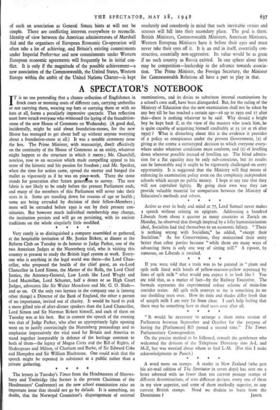Very rarely is so distinguished a company assembled as gathered,
at the hospitable invitation of Mr. Justice Birkett, at dinner at the Reform Club on Tuesday to do honour to Judge Parker, one of the two American Judges at the Nuremberg trial, who• is visiting this country at present to study the British legal system at work. Every- one who is anything in the legal world was there—the Lord Chan- cellor, who proposed the health of the chief guest, an ex-Lord Chancellor in Lord Simon, the Master of the Rolls, the Lord Chief Justice, the Attorney-General, Law Lords like Lord Wright and Lord Macmillan, Lord Schuster, half a dozen or so High Court Judges, advocates like Sir Walter Monckton and Mr. G. 0. Slade— and so on. Of the only two laymen in the company one is (among other things) a Director of the Bank of England, the other a person of no importance, invited out of charity. It would be hard to pick a more gifted trio of after-dinner speakers than the Lord Chancellor, Lord Simon and Sir Norman Birkett himself, and each of them on Tuesday was at his best. But in content the speech of the evening was that of Judge Parker, who after an appropriately light opening went on to justify convincingly the Nuremberg proceedings and to emphasise impressively the vital need for Britain and America to stand together inseparably in defence of the heritage common to both of them—the legacy of Magna Carta and the Bill of Rights, of Shakespeare and Milton, of Chatham and Burke, of Sir Edward Coke and Hampden and Sir William Blackstone. One could wish that the speech might be repeated in substance at a public rather than a private gathering.
* * * *






























 Previous page
Previous page